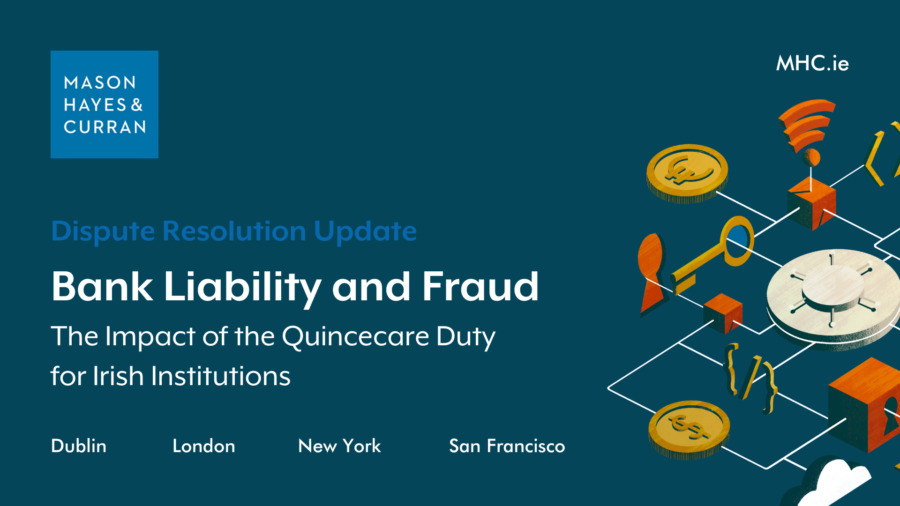Bank Liability and Fraud
The impact of the Quincecare Duty for Irish institutions

The development of the Quincecare duty in the English Courts has yet to be mirrored in Ireland. Beyond their regulatory obligations, banks must ensure that they discharge the reasonable duty of care owed by them to their customers. Our Dispute Resolution team reviews the scope of the Quincecare duty and its potential impact on banks in Ireland.
What you need to know
- The Quincecare duty, considered by the UK Supreme Court, is an application of the reasonable duty of care owed by banks.
- The duty applies when a bank has reasonable grounds to believe that a customer’s agent is performing a transaction to misappropriate the customer’s funds.
- The duty is only owed to customers.
- The duty does not apply when a customer provides an unequivocal instruction, even if the instruction resulted from a fraud.
- The courts are slow to extend the scope of the duty and have refused to do so in cases of authorised push payment fraud.
Introduction
While the regulation of banking is continually expanding, banks also need to be aware of their general duties of care. The most topical of these duties is known as the Quincecare duty, which has been recently considered by the UK Supreme Court.[1] Although it has been deployed on numerous occasions in the English courts, the duty has never properly been considered in Ireland.[2]
Whether Irish banks should be particularly concerned by the Quincecare duty is dependent on their ability to discharge the duty owed to identify and respond to deficient payment instructions.
Background of the Quincecare duty
Mr Harry Stiller engaged with the Hull branch of Barclay’s Bank in 1984 as an agent of a company for the purposes of committing a fraud. He was successful. The Quincecare duty emerged from the consequential 1988 judgment in Barclays Bank plc v Quincecare Ltd and another.[3]
Simply put, a bank must refrain from executing an order to transfer money given by an agent of a customer if it has reasonable grounds for believing that the order is an attempt to misappropriate the customer’s funds. As noted by the judge in the case, this requirement does not go any further than the duty owed by banks when put on inquiry of a transaction.
Barclays Bank was held to have acted reasonably when honouring the fraudulent order. Indeed, in many cases considering the Quincecare duty, banks emerge on the better side of the argument. One could speculate that this is because the duty merely imposes an expectation that orders will be performed with reasonable skill and care.
Despite this, claimants have made attempts to expand the duty. The UK Supreme Court in Philipp v Barclays Bank considered an argument that the duty should be owed in cases of authorised push payment fraud, also referred to as 'APP'. While doing so, the UK Supreme Court took the opportunity to criticise the reasoning underlying the Quincecare duty, without altering the thrust of the duty.
Condensing Philipp into five key takeaways, and as set out in a more recent case of Larsson v Revolut Limited[4], we note that:
- Banks are obliged to act promptly to a customer’s payment instruction, without assessing the wisdom of a customer’s decision.
- The Quincecare duty is not some special rule of law. The duty, applying to orders from a customer’s agent, is merely an application of the general duty of skill and care owed by banks to their customers to act in accordance with their instructions. This is no different to when a customer provides unclear instructions, and a bank is on notice to seek clarity.
- The Quincecare duty does not apply when the customer makes an unequivocal instruction to a bank. Further, the duty does not apply when a bank does not have reasonable grounds to suspect that an instruction given by an agent on behalf of a company is an attempt to defraud the company.
- When an unequivocal instruction is made, it is not invalidated if the deceit of a third party resulted in the instruction.
- The Quincecare duty applies only to customers of the bank, and not to third parties even where the bank is aware of third party interests.
In Philipp, the claimant’s unequivocal instruction led to the dismissal of the part of her claim based on the Quincecare duty — despite the fact that her transactions were the result of an obvious fraud. The UK Supreme Court held that any expansion of the Quincecare duty to offer broader consumer protection is a matter for legislators, not the courts.
Importantly for banks, the UK Supreme Court clarified that a claim based on the Quincecare duty is an action in debt, not a claim for damages. This reflects the fundamental nature of the bank-customer relationship as one of debtor and creditor — a distinction that removes the need for the claimant to prove causation. This means that a claimant will be successful if he or she establishes that:
- The payment instruction was invalid
- The bank had reasonable grounds to suspect that an agent was engaging in fraudulent behaviour
- The bank took no action to interrogate the instruction given
Comment
With the advent of the new Payment Services Directive (PSD3) and Payment Services Regulation over the next two years, banks should be mindful of their new obligations.
While the UK Supreme Court in Philipp has limited the Quincecare duty, this has not prevented a raft of proceedings coming before the UK courts with novel claims particularly relating to APP. There will likely be a similar increase in activity in this area of law in Ireland.
For more information and expert advice, contact a member of our Dispute Resolution team.
The content of this article is provided for information purposes only and does not constitute legal or other advice.
[1] Philipp v Barclays Bank [2023] UKSC 25
[2] The Quincecare duty was briefly referenced but not considered in Razaq v AIB plc & anor [2009] IEHC 176
[3] [1992] 4 All ER 363
[4]
Larsson v Revolut Limited [2024] EWHC 1287 (Ch)
Share this:



